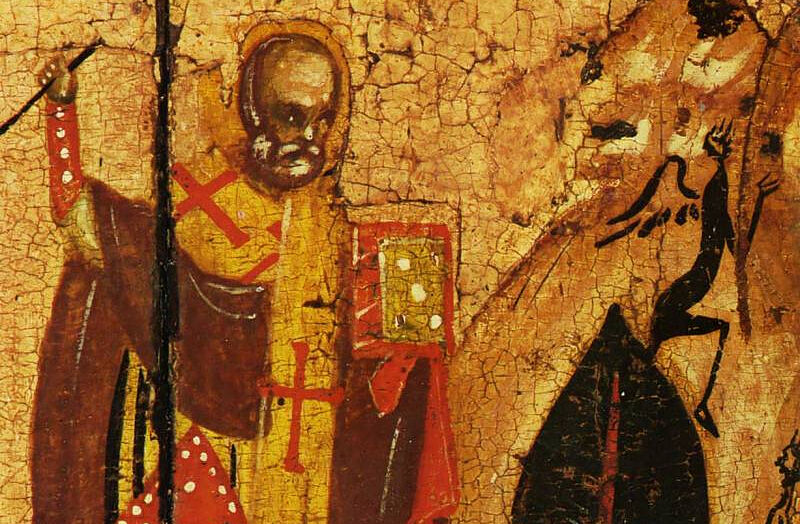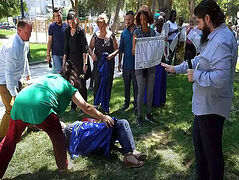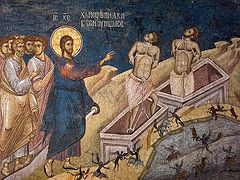Moscow, September 1, 2022
 St. Nicholas expelling a demon. Photo: icon-art.info
St. Nicholas expelling a demon. Photo: icon-art.info
The Russian Orthodox Church is currently accepting feedback and discussions on the topic of exorcisms.
The Inter-Council Presence of the ROC produced the document, “The Russian Orthodox Church’s Stance Towards Modern Exorcism Practices,” which discusses the history of the rite of exorcism and its modern practice in the various Local Churches, and offers spiritual guidance on how to properly perform an exorcism.
The document is hosted on the site of the Inter-Council Presence, where a discussion is being held until October 30.
The document (found here) begins: “The Church regards possession by evil spirits as a special condition that, for various reasons, can be tolerated by God. Without God’s permission, demonic possession, like any bodily or mental infirmity, cannot touch a person.”
The Church has a special prayer rite to free people from demonic possession, the document notes, thus putting the matter in God’s hands. Scripture and the Apostolic Fathers show that exorcism is ancient practice, and specific liturgical rites have developed at least from the third century.
The Russian Church reached out to other Local Churches to inquire of their current practice, and found that exorcisms aren’t practiced in the Churches of Alexandria, Antioch, Greece, Poland, and the Orthodox Church in America. Elsewhere, exorcisms are carried out with restrictions and regulations.
The Russian Church also has a cautious attitude due to abuses on the part of both those performing and those participating in the rite of exorcism.
“In some cases, when performing the rite of exorcism, the sick are subjected to humiliation or psychological violence, which is unacceptable. Abuses of this type include mass ‘exorcisms’ involving extraneous ‘spectators,’ as well as photo and video recordings with subsequent public distribution of recordings and photographs,” the document states.
On the other hand, abuse on the part of participants includes a magical perception, where an exorcism is seen as a replacement for a true, repentant spiritual life.
But abuses are not a reason to abolish the rite, the document states: “It must be borne in mind that leaving a truly possessed person without appropriate spiritual help can lead to serious consequences for him, for example, despair or even suicide.”
Thus, the Russian Church proposes conditions for the lawful use of the exorcism rite:
1. It can be performed only by a bishop or a priest who has the blessing of his ruling bishop. The Church expects a high spiritual life from the exorcist, who prepares himself by prayer, fasting, Confession, and Communion. But at the same time, the priest casts out demons not by his own power, but by the power of God. Spiritual experience is also needed to identify who is truly in need of an exorcism.
2. Exorcisms are only for demonic possession, which must be distinguished from mental illness and unhealthy religiosity. At the same time, it’s incorrect to try to treat any spiritual disorder with clinical methods. Clergy are recommended to familiarize themselves with the basics of psychiatry so they can refer a parishioner when necessary. They also mustn’t confuse possession with addiction. Exorcism doesn’t replace repentance and the life in the Sacraments.
In conclusion, the document states:
Those believers who need the exorcism rite, as well as those who have already gone through it, must remember that the Christian attitude to possession consists in humbly accepting the will of God, in realizing their sinfulness, in repentance, and changing their lifestyle. Only a significant change in both the internal structure of one’s soul and the external structure of life can lead to the complete liberation of the soul from the influence of the dark forces. Whether the Lord is pleased to deliver a person from possession after the exorcism or not, this should be accepted with due humility and gratitude to God.
Follow OrthoChristian on Twitter, Vkontakte, Telegram, WhatsApp, MeWe, and Gab!




